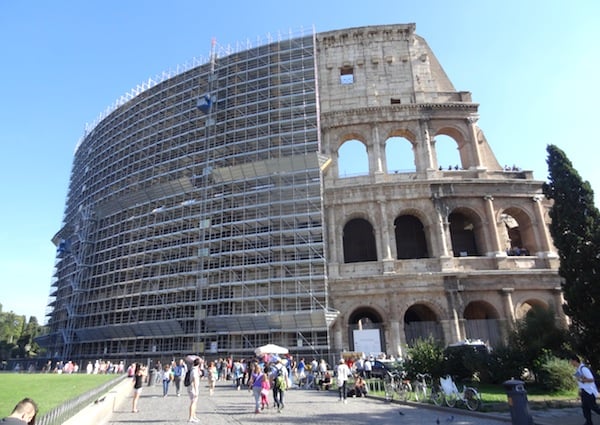
The European Union has withdrawn €51 million ($57.6 million) in cultural and tourism funding from Italy after the southern regions of Sicily, Calabria, and Campania failed to spend hundreds of millions of EU money.
Citing EU documents, the Art Newspaper reported that the funds were taken back after Sicily didn’t spend the money before the deadline at the end of 2015. The news is all the more disturbing considering that inefficiency and poor planning has left Italy’s cultural infrastructure in a crumbling state, leading to a dependency on private benefactors and corporate sponsors.
The report also reportedly reveals evidence of poorly prepared funding requests by Sicilian cultural office between 2007 and 2013, including badly written proposals, and grave oversights such as inconsistent figures, late submissions, and papers sent to the wrong email address.
The Trevi Fountain was restored with funds from luxury brand Fendi.
Photo: Sarah Cascone
For example, the EU rejected a funding request for €2.4 million ($2.7 million) submitted by the Archaeological Museum of Aidone in Sicily because of incomplete documents and a missing “economic framework;” a €2 million ($2.2 million) request for the restoration of the Greek ruins of Eraclea Minoa because it was “sent to the wrong email address and for substantial shortcomings in the forms;” and a €10 million request for the restoration of a 13th century Swabian castle at the port of Augusta, because of “inconsistent figures and other bureaucratic errors.”
As a result, the president of Sicily Rosario Crocetta, his predecessor Raffaele Lombardo, and four regional officials were are now under investigation for neglecting Sicilian heritage.
Meanwhile, €70 million ($79.3 million) out of a total €95 million ($107.7 million) in EU grants from the European Development Fund, allocated for “major tourism events” were judged to have been misspent.
According to the European Commission, events including a road race at Castelbuono and the living nativity scene at Custonaci were indicative of the “uneven and fragmented” tourism funding proposals put forward by the region.
Naples historic old town. Photo: Wikimedia Commons
In Naples, €100 million ($113.3 million) in EU funding allocated towards the restoration of the city’s UNESCO listed historic town center hasn’t been spent yet. Of the 28 planned projects, only eight were completed by the 2015 deadline. The regional council of Campania’s request for an extension to push back the deadline to 2020 is currently under review.
Meanwhile, the long-struggling Great Pompeii Project, launched in 2012 with €41.8 million ($58 million) in EU support, will continue through the end of 2017, even though the funding was originally set to expire at the end of 2015. Despite a number of collapses and thefts at the crumbling city the conservation effort is currently looking up, with the successful restoration of the Villa of Mysteries last year.
The paper stressed that funding allocation and spending in other regions across Italy, including Lombardy and Tuscany in the north and Basilicata and Puglia in the south, are in line with the rest of the European Union.
However, the revelations—which come to light amid the recently announced $1.1 billion cultural investment—raise uncomfortable questions over how some Italian municipalities and local officials manage heritage preservation projects. How much of the unprecedented billion dollar cash injection will be lost because of mismanagement?